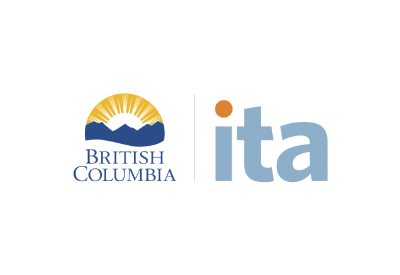ITA Celebrating and Supporting Success of Indigenous People in Trades Careers

June 19, 2020
Supporting the success of Indigenous people and communities in skilled trades careers is a key commitment of Industry Training Authority (ITA). ITA is proud to be celebrating the achievements of all apprentices, partners, service providers, and employees on National Indigenous Peoples Day, June 21.
ITA has been working with Indigenous individuals, employers, and organizations for many years to support First Nations, Inuit, and Métis prosperity throughout B.C. and Canada. Indigenous cultural inclusion and reconciliation is a strategic priority both within ITA and in how it connects with its partners.
A key to increasing opportunities for Indigenous people in trades careers has been the formalizing of partnerships with local and regional organizations. ITA’s community-based training model (CBTM) helps bring programming into rural and remote regions of B.C. This model has helped develop greater local skills creation and employment opportunities, social and economic development, and a sustainable, regional work force. Indigenous community partners and groups share their culture with ITA to enable staff to better understand those with whom they work closely.
“To be able to bring the technical trades training to communities across B.C., and for those communities to be able to provide the opportunity for their apprentices to cover the scope of trade and work experience in all levels of their apprenticeship, is truly remarkable,” said Michael Cameron, Director of Indigenous Initiatives at ITA. “The collaborative effort of ITA with our partners demonstrates a true commitment to reconciliation and the innovation in removing barriers to Indigenous peoples’ success in trades training.”
For remote communities, a strong, highly-trained cohort of trades professionals creates self-sufficiency and a lasting legacy of infrastructure and knowledge. Trades training plays a big part in preparing community members for economic opportunities as well as providing in-community skilled individuals for projects on and off reserve. With CBMT, apprentices can develop practical, real-life work experience as well as earn workplace certifications.
Sending community members away for skills training isn’t just expensive; it also means the apprentices have to spend time away from their families. For a fraction of the cost, CBTM brings instructors into communities instead. It is also supported by work or capital projects in the community or region, to aid in the individual’s apprenticeship pathway.
“I can sum up our relationship with the ITA this way: Ama Sqwetsp: A Good Journey—a good journey working together bringing community-based training to the community that will expand the horizons for today, and tomorrow’s generations,” said Catherine Pascal, Manager of Employment and Training at the Tśzil Learning Centre for the Líl̓wat Nation.
To make CBTM a reality in communities around the province, since 2018, ITA has signed 12 Memoranda of Understandings (MOUs) with First Nations communities, Indigenous Skills and Employment Training (ISET) agreement holders, and a Hereditary Chieftain group with the goal of increasing trades sponsorship and apprenticeships within their regions.
Through these MOUs, partners become the sponsors of apprentices working on local projects, ensuring employment for their local communities and creating an appropriate cultural approach to an apprenticeship pathway and experience. This has supported apprenticeship opportunities and training that have created greater local skills creation and employment opportunities, economic development, and a sustainable work force.
“On Sunday, we celebrate Indigenous, Métis, and Inuit people. Our journeys, our resilience, and our successes express our identity and values,” said Gary Patsy, Manager of Nisga’a Employment, Skills & Training (NEST), on behalf of the Nisga’a Government. “NEST is honoured to be collaborating with the Industry Training Authority to support Nisga’a apprentices and tradespeople to access a meaningful trades career. In alignment with a strong and productive relationship, NEST and ITA connect Nisga’a citizens to sustainable employment options close to home and throughout B.C. to achieve a higher quality of life and to move B.C. forward.”
Fast Facts
- As at the end of March 2020, Indigenous peoples comprised eight percent of apprentices registered with ITA.
- Over the past 10 years, B.C.’s Indigenous peoples’ representation in the trades training and apprenticeship system has continually increased:
- The number of Indigenous peoples participating in apprenticeship training has grown from just over 500 to just over 3,000 (a 474 percent increase).
- Indigenous women participating in apprenticeship training has also grown, from just under 80 to just under 500 (a 555 percent increase).
- The number of Indigenous women participating in under-represented trades—this includes all trades except cook, baker, hairstylist, and landscape horticulturalist—increased from just over 30 to just under 300 (a 835 percent increase).
- The number of Certificates of Qualification issued to Indigenous peoples has also increased; for Indigenous men, from 64 to 255 (298 percent increase) and for Indigenous women, from 15 to 60 (300 percent increase).
- ITA partners with a minimum of four ISETs annually in delivering First Nations/industry forums to help bridge the cultural understanding between Indigenous people and industry with the goal of forging new partnerships
- In 2008, ITA established its Indigenous Advisory Council to provide input and recommendations to ITA on how to increase participation in skilled trades training amongst Indigenous people across the province.
For more information, visit itabc.ca









![Guide to the Canadian Electrical Code, Part 1[i], 26th Edition– A Road Map: Section 56](https://electricalindustry.ca/wp-content/uploads/2022/11/Guide-CE-Code-2.png)






